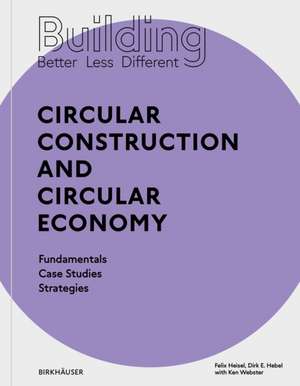Building Better – Less – Different: Circular Con – Fundamentals, Case Studies, Strategies
Autor Felix Heisel, Dirk E. Hebel, Ken Websteren Limba Engleză Paperback – 6 noi 2022
Each volume of "Building Better - Less - Different" details two fundamental areas of sustainability and explores their specific dynamics and interactions. After introductory overviews, innovative methods and current developments are described and analysed in in-depth essays, international case studies and pointed commentaries. The sustainability criteria of efficiency ("better"), sufficiency ("less") and consistency ("different") form the framework for each book.
The first volume presents concepts, methods and examples of circularity in construction and the economy. Urban mining and circular construction are two approaches to the challenges that architecture and urban design are facing, using techniques such as mono-material construction and design for disassembly, and tools such as materials passports and databases. The circular economy is not solely about recycling but encompasses a wide range of strategies from local community projects to new ownership and service models and steering mechanisms such as carbon fees and dividends.
Preț: 330.48 lei
Nou
Puncte Express: 496
Preț estimativ în valută:
63.26€ • 68.73$ • 53.17£
63.26€ • 68.73$ • 53.17£
Carte disponibilă
Livrare economică 31 martie-14 aprilie
Livrare express 14-20 martie pentru 44.32 lei
Preluare comenzi: 021 569.72.76
Specificații
ISBN-13: 9783035621099
ISBN-10: 3035621098
Pagini: 160
Ilustrații: 90 col. ill., 50 col. graphics
Dimensiuni: 223 x 281 x 17 mm
Greutate: 0.66 kg
Editura: MC – De Gruyter
ISBN-10: 3035621098
Pagini: 160
Ilustrații: 90 col. ill., 50 col. graphics
Dimensiuni: 223 x 281 x 17 mm
Greutate: 0.66 kg
Editura: MC – De Gruyter
Notă biografică
Cuprins
From the Contents
Sustainability - The Importance of a Holistic Approach
Principles of Circular Construction
Principles of a Circular Economy
Better:
Better - Efficiency in the Construction Industry
The Case for Deconstruction
Building Capacity and Knowledge in the Local Economy
New Buildings from Old
Deconstruction of Place, Acceleration of Waste
Better - Moving towards Eco-efficiency
Reuse Infrastructure
Deconstruction Policy in Portland, Oregon
Less:
Less - Sufficiency as Innovation
Strength Through Geometry and Material Effectiveness
Less - Moving towards Eco-effectiveness
The Economy of Urban Mining
Carbon Fees and Dividends, and a Circular Construction Industry
Towards a More Responsible Society with the Polluter Pays Principle
Different:
Different - Consistency as a Principle
Ecology Must Have Priority!
The Kendeda Building for Innovative Sustainable Design
Triodos Bank
Concular
Materials Passports
The Urban Village Project
Different - Moving towards Disruptive Innovation
Cooling as a Service (CAAS)
A Circular Approach in Flooring
Be Careful What You Wish For
Better + Less + Different:
The Urban Mining and Recycling (UMAR) Unit
Sustainability - The Importance of a Holistic Approach
Principles of Circular Construction
Principles of a Circular Economy
Better:
Better - Efficiency in the Construction Industry
The Case for Deconstruction
Building Capacity and Knowledge in the Local Economy
New Buildings from Old
Deconstruction of Place, Acceleration of Waste
Better - Moving towards Eco-efficiency
Reuse Infrastructure
Deconstruction Policy in Portland, Oregon
Less:
Less - Sufficiency as Innovation
Strength Through Geometry and Material Effectiveness
Less - Moving towards Eco-effectiveness
The Economy of Urban Mining
Carbon Fees and Dividends, and a Circular Construction Industry
Towards a More Responsible Society with the Polluter Pays Principle
Different:
Different - Consistency as a Principle
Ecology Must Have Priority!
The Kendeda Building for Innovative Sustainable Design
Triodos Bank
Concular
Materials Passports
The Urban Village Project
Different - Moving towards Disruptive Innovation
Cooling as a Service (CAAS)
A Circular Approach in Flooring
Be Careful What You Wish For
Better + Less + Different:
The Urban Mining and Recycling (UMAR) Unit
